Related Research Articles

Textile is an umbrella term that includes various fiber-based materials, including fibers, yarns, filaments, threads, different fabric types, etc. At first, the word "textiles" only referred to woven fabrics. However, weaving is not the only manufacturing method, and many other methods were later developed to form textile structures based on their intended use. Knitting and non-woven are other popular types of fabric manufacturing. In the contemporary world, textiles satisfy the material needs for versatile applications, from simple daily clothing to bulletproof jackets, spacesuits, and doctor's gowns.

The British Wool Marketing Board operates the central marketing system for UK fleece wool. A farmer-run organisation, British Wool was established in 1950 with the aim of achieving the best possible net return for producers. It is the only organisation in the world that collects, grades, sells and promotes fleece wool and is the only remaining agricultural commodity board in the UK.

Worsted is a high-quality type of wool yarn, the fabric made from this yarn, and a yarn weight category. The name derives from Worstead, a village in the English county of Norfolk. That village, together with North Walsham and Aylsham, formed a manufacturing centre for yarn and cloth in the 12th century, when pasture enclosure and liming rendered the East Anglian soil too rich for the older agrarian sheep breeds. In the same period, many weavers from the County of Flanders moved to Norfolk. "Worsted" yarns/fabrics are distinct from woollens : the former is considered stronger, finer, smoother, and harder than the latter.
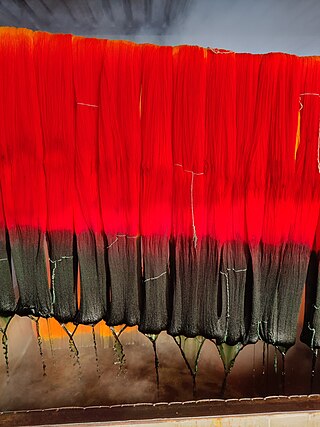
Dyeing is the application of dyes or pigments on textile materials such as fibers, yarns, and fabrics with the goal of achieving color with desired color fastness. Dyeing is normally done in a special solution containing dyes and particular chemical material. Dye molecules are fixed to the fiber by absorption, diffusion, or bonding with temperature and time being key controlling factors. The bond between dye molecule and fiber may be strong or weak, depending on the dye used. Dyeing and printing are different applications; in printing, color is applied to a localized area with desired patterns. In dyeing, it is applied to the entire textile.
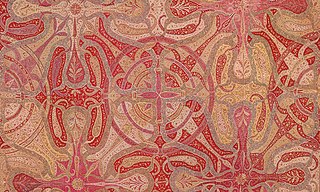
Pashmina refers to, depending on the source, a term for cashmere wool of the Changthangi cashmere goat, for fine Indian cashmere wool or a synonym for cashmere wool.
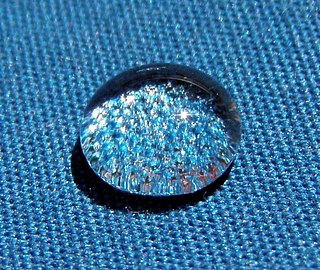
"Technical textile" refers to a category of textiles specifically engineered and manufactured to serve functional purposes beyond traditional apparel and home furnishing applications. These textiles are designed with specific performance characteristics and properties, making them suitable for various industrial, medical, automotive, aerospace, and other technical applications. Unlike conventional textiles used for clothing or decoration, technical textiles are optimized to offer qualities such as strength, durability, flame resistance, chemical resistance, moisture management, and other specialized functionalities to meet the specific needs of diverse industries and sectors.
The study of the history of clothing and textiles traces the development, use, and availability of clothing and textiles over human history. Clothing and textiles reflect the materials and technologies available in different civilizations at different times. The variety and distribution of clothing and textiles within a society reveal social customs and culture.
A staple fiber is a textile fiber of discrete length. The opposite is a filament fiber, which comes in continuous lengths. Staple length is a characteristic fiber length of a sample of staple fibers. A fiber is made up of natural substances and is known for being longer than it is wide. It is an essential criterion in yarn spinning, and aids in cohesion and twisting. Compared to synthetic fibers, natural fibers tend to have different and shorter lengths. The quality of natural fibers like cotton is categorized on staple length such as short, medium, long staple, and extra-long. Gossypium barbadense, one of several cotton species, produces extra-long staple fibers. The staple fibers may be obtained from natural and synthetic sources. In the case of synthetics and blends, the filament yarns are cut to a predetermined length.
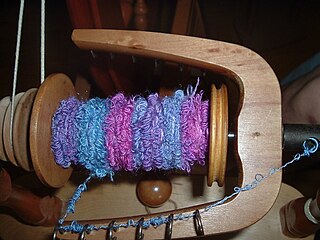
Bouclé is a looped yarn or the resulting fabric woven from this yarn.
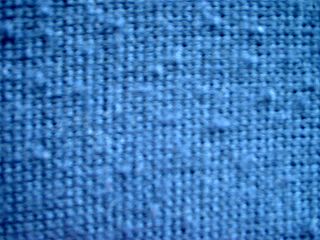
A pill, colloquially known as a bobble, fuzzball, or lint ball, is a small ball of fibers that forms on a piece of cloth. Pill is also a verb for the formation of such balls.
Razor blade steel, also known as razor steel, is a special type of stainless steel designed specifically to be used as a razor blade. Its defining characteristics are its chemical composition and shape. Jindal Stainless is the world's largest producer of razor blade stainless steel.
Noori was a female pashmina goat, the first pashmina goat to be cloned using the process of nuclear transfer. Born on 9 March 2012, she was kept at the place of her birth, at the Faculty of Veterinary Sciences and Animal Husbandry, Sher-e-Kashmir University of Agricultural Sciences and Technology of Kashmir, Shuhama, Srinagar in the Indian territory of Jammu and Kashmir.
A laminated fabric is a two layer construction with a polymer film bonded to a fabric. Laminated fabrics are used in rainwear, automotive, and other applications. Windstopper is an example of such fabrics.
Fukuoka Stock Exchange (FSE) is a stock exchange located in Fukuoka, Japan. It operates Q-Board, a special market for new companies. In August 2000, the exchange closed its trading floor and adopted the electronic trading system of Tokyo Stock Exchange. In January 2002, FSE reached an agreement with the four other Japanese stock exchanges and Japan Securities Dealers Association, JSDA to establish Japan Securities Clearing Corporation, JSCC.

The International Wool Secretariat (IWS) was formed in 1937 to promote the sale of wool on behalf of woolgrowers and review research carried out by independent bodies such as the Wool Industries' Research Association at Torridon, Headingley Lane, Leeds, England.
The New Zealand Wool Board was established in 1944 under the Wool Industry Act. McKinsey & Company published a report in 2000 that sparked two years of debate for referendums and reforms to the New Zealand Wool Board. In 2001, McKinsey's recommendations were implemented and Wool Board was dissolved and was completely restructured.
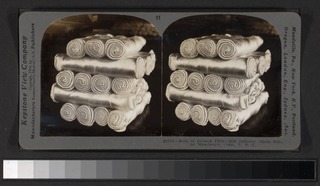
Greige goods are loom state woven fabrics, or unprocessed knitted fabrics. Greige goods undergo many subsequent processes, for instance, dyeing, printing, bleaching, and finishing, prior to further converting to finished goods such as clothing, or other textile products. "Grey fabrics" is another term to refer to unfinished woven or knitted fabrics.

An Automotive textile is a technical textile used in the transportation and automotive industries. The choice of type of automotive textile focuses on aspects of safety, comfort, and aesthetics. These textiles have variety of applications in the automotive industry, such as interior fittings, safety features, sound insulation, and tire reinforcement.
Indutech is the branch of technical textile that deals with textiles used in the diverse industrial applications such as in filtration, conveying, cleaning and other industrial uses.

Scouring is a preparatory treatment of certain textile materials. Scouring removes soluble and insoluble impurities found in textiles as natural, added and adventitious impurities, for example, oils, waxes, fats, vegetable matter, as well as dirt. Removing these contaminants through scouring prepares the textiles for subsequent processes such as bleaching and dyeing. Though a general term, "scouring" is most often used for wool. In cotton, it is synonymously called "boiling out," and in silk, and "boiling off."
References
- ↑ Julian Roche (1995). The International Wool Trade. Woodhead Publishing. ISBN 1-85573-191-6.
- ↑ B. P. Saville (1999). Physical Testing of Textiles. Woodhead Publishing. ISBN 1-85573-367-6.